Feb 20, 2023 | Non categorizzato
God chose to convey the grace that saves people through people themselves. That is, he chose to save us through our love for one another, through the charity and care we have for our neighbours. Just when it seems that we have nothing to offer, that we are of no use, he shows us a way to knock on his door as children, to ask and trust. Special request By chance, I had become aware of a patient admitted to hospital in a desperate condition. To save her, a specific blood type was needed, but it could not be found. I did my best to search for it, both among my acquaintances and in my work environment (I am a nurse in the outpatient clinic of a charitable organisation). But nothing could be found. I was about to surrender my arms, heavy in defeat, when a heartfelt prayer to the almighty rose from my soul, a request. My ward duty hours were over, and the specialist doctor I was assisting said goodbye and left. Just a few moments later, a young woman came in for an examination. I asked the lady for her ID and she handed me her Avis card. I almost couldn’t believe my eyes – what if she had that blood type? If he was available? I rushed to call the doctor back and, unlike other times, found him willing to return to surgery. That’s right! That same afternoon, the woman was at the sick woman’s bedside for the direct transfusion. A. M. M., Italy Behind a door Starting with the idea of halving my personal belongings, giving them away to those who might need them, I established new relationships. I began with two expensive jackets that I seldom wear, offering them to my Moroccan neighbour, whose daughter or daughter-in-law might be interested. She liked them, and in turn begged me to accept a new, never-worn beige coat. For me this brought a lot of work to find out whom to give it to, but it served to get to know my neighbours. Two hours later I met a friend who happily accepted the coat for her sister, who only wears beige! The day continued, marked by the phrase, ‘Give and it shall be given to you’. In fact, I happened to receive furniture, dishes, linen for the flat I have recently moved into. For us Swiss, it is difficult to cross the threshold of a neighbour’s house – we are always afraid of disturbing. But how much humanity is hidden behind doors! It only takes a few minutes of entertainment over a coffee and the filters of prejudice fall away, the heart expands and the family space grows. Isabelle, Switzerland
Edited by Maria Grazia Berretta.
From “Il Vangelo del Giorno,” Città Nuova, year IX, no. 1, January–February 2023.
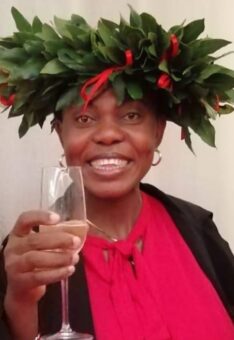
Feb 16, 2023 | Non categorizzato
Diana, Argia and Jane donate their time every day to help other women escape the repulsive phenomenon of human trafficking and slavery. Their stories were told for this year’s International Day of Prayer and Awareness Against Human Trafficking. Each year, 8 February marks the International Day of Prayer and Awareness Against Human Trafficking. The Talitha Kum international network – which has more than 3,000 members and is supported by the Vatican and many associations, including the Focolare Movement – organised an online pilgrimage this year, “Walking for Dignity.” It included experiences from various parts of the world, and two in particular are linked to the Focolare Movement. Diana and Argia, from Naples, Italy, have been involved for years in a women’s association called “Donne Meridiane,” which works in social work and cultural education.

Blessing Degree
Lorenzo Russo
VIDEO: St. Peter’s Square, Rome, flash mob against human trafficking. https://www.youtube.com/watch?v=kUPDp1PaaHc

Feb 15, 2023 | Non categorizzato
Immerse yourself in the sense of dialogue and confront each other in order to be able to live it concretely every day. This is the main objective of the 8 webinars promoted by the project “DialogUE: Diverse Identities ALlied Open to Generate a United Europe”. A way to deepen and grasp the beauty of this art, open to all. Can Christians, Muslims and members of other religions understand one another? Can we work together with those who, despite having the same creed, live it with avant-garde expressions or on the contrary anchored to traditions? Can those who believe in an eternal God and those who do not believe in life after death communicate? How can we build a united Europe between the countries of East and West so different in history, culture, development and tradition? These are the questions that drive the DialogUE project – Diverse Identities Allied Open to Generate a United Europe, a project born in Europe in particular through the International New Humanity Association, an expression of the Focolare Movement that, since its inception, has made dialogue a lifestyle, a mission to which it is committed daily at various levels together with many organizations that share the same passion to build more fraternal societies. The CERV Programme of the European Commission approved and financed the project. Its focus is people and values centred and its objective is to explore and develop the often challenging dialogue between different groups over a period of two years, in order to shape a Europe that is ever more an expression of that “unity in multiplicity” which is the reason for its existence. 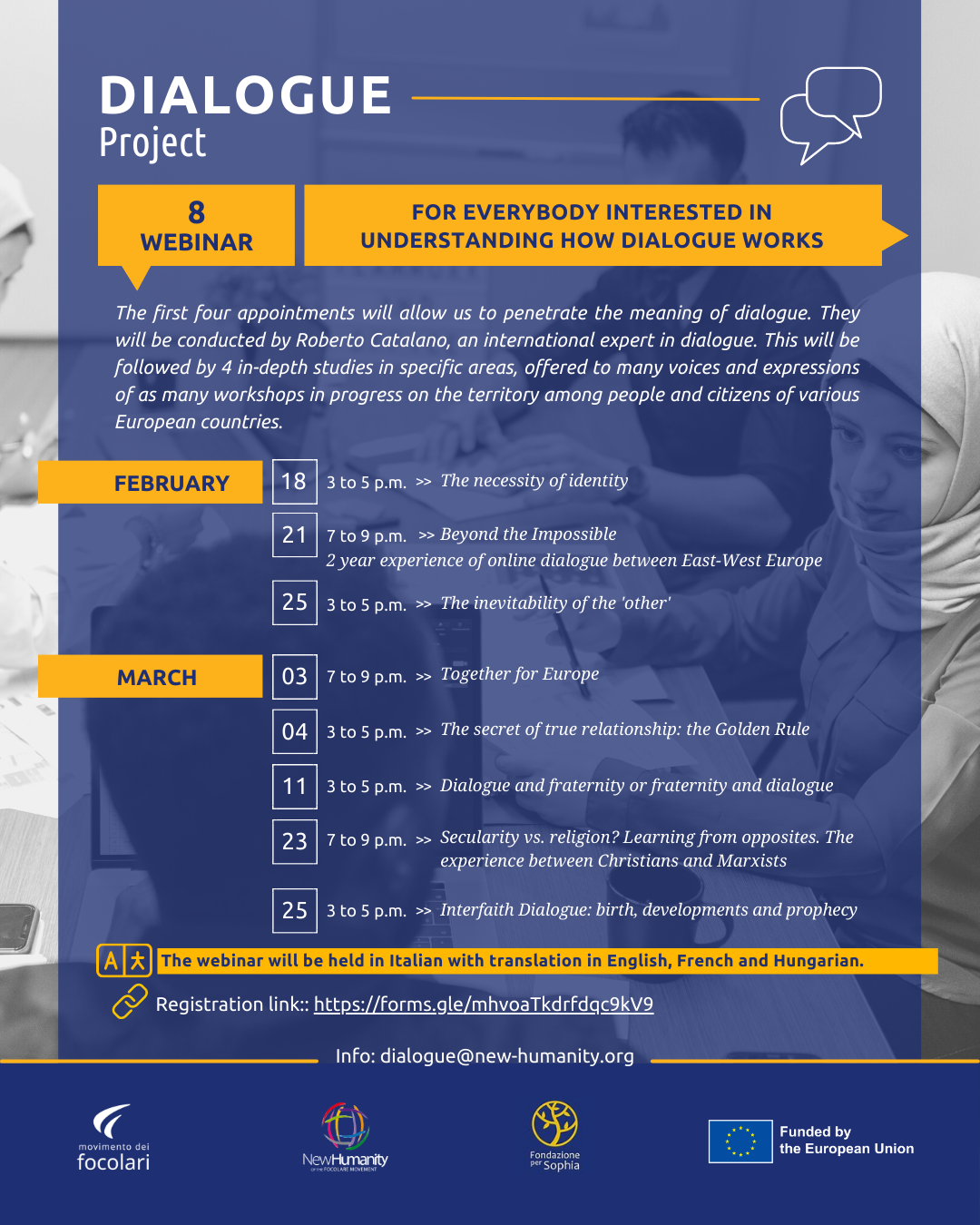 On this basis, and in collaboration with the “Foundation for Sophia”, starting on 18th February 2023, it will be possible to participate in an in-depth study on dialogue through an online course divided into 8 appointments. These webinars are open to all and can be followed in Italian with translation into English, French and Hungarian. The first four aim to provide a real sense what of dialogue is and will be led by Roberto Catalano, an international expert on dialogue. These will be followed by 4 in-depth studies in specific areas, offered by several voices, expressing just as many ongoing workshops among people and citizens of various European countries. The timetable indicating the various topics to be addressed, is as follows (Italian time):
On this basis, and in collaboration with the “Foundation for Sophia”, starting on 18th February 2023, it will be possible to participate in an in-depth study on dialogue through an online course divided into 8 appointments. These webinars are open to all and can be followed in Italian with translation into English, French and Hungarian. The first four aim to provide a real sense what of dialogue is and will be led by Roberto Catalano, an international expert on dialogue. These will be followed by 4 in-depth studies in specific areas, offered by several voices, expressing just as many ongoing workshops among people and citizens of various European countries. The timetable indicating the various topics to be addressed, is as follows (Italian time):
18/02/2023, 15:00 – 17:00 – The necessity of identity
21/02/2023, 19:00 – 21:00 – Beyond the impossible 2 year experience of online dialogue between East-West Europe
25/02/2023, 15:00 – 17:00 – The inevitability of the ‘other’
03/03/2023, 19:00 – 21:00 – Together for Europe
04/03/2023, 15:00 – 17:00 – The secret of true relationship: the Golden Rule
11/03/2023, 15:00 – 17:00 – Dialogue and fraternity or fraternity and dialogue
23/03/2023, 17:00 – 19:00 – Secularity vs religion? Learn from opposites. The experience between Christians and Marxists
25/03/2023, 15:00 – 17:00 – Interfaith Dialogue: birth, developments and prophecy
It will be a discovery which responds to the need to communicate and discover the wealth of each person, specifically valuing what unites, viewing differences as a fertile ground to grow patiently respecting everybody. Participate by filling out the registration form at the following link: https://forms.gle/mhvoaTkdrfdqc9kV9 For further information, please contact: dialogue@new-humanity.org.
by Maria Grazia Berretta
Feb 14, 2023 | Non categorizzato
Loving each other in marriage is a great challenge. It means getting lost in each other’s paths, sharing life, sowing patiently and reaping the fruits; it means choosing each other every day even when we do not recognize each other, if necessary, learning to slow down to keep up with each other. On the day of lovers, we share the story told at the November 2017 “Collegamento” by Giulio and Pina Ciarrocchi. 22 years earlier, in May 1995, following the arrival of a stroke that changed their lives, they found the courage to let God guide them, experiencing a new way to fall in love again every day, seeing Jesus in each other. https://www.youtube.com/watch?v=ZM6vJUrUqX8&list=PL9YsVtizqrYt2S6qrtBBS1Xu_B3p-juwd&index=1
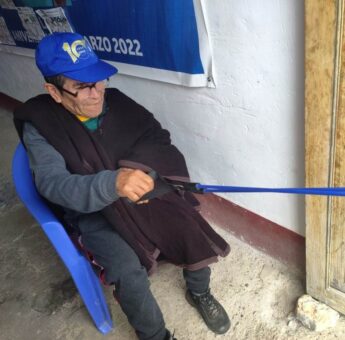
Feb 11, 2023 | Non categorizzato
The mission of the “Chiara Lubich” Hogarcito, the Centre for the Elderly in the Peruvian Amazon forest, is to accompany the elderly and the ill. A place where service is motivated by love, where there are people who do good, able to put everything in God’s hands. Halfway through last year a woman came to the Hogarcito to ask for help. She urgently needed support for her elderly brother who lived alone, far from the capital where she lived. She asked us to welcome him into the “Hogarcito” and, after asking her to give us some time to explore the situation and our own possibilities, we put ourselves in the shoes of her brother and did not hesitate to welcome him. This is how Feliciano, 74, became a new guest of the Hogarcito. We welcomed him with great affection and with a welcome party. We discovered that he had lost the sight of one eye, that he had speech problems, you could barely understand what he was saying, as well as severe deafness.

Feliciano during rehabilitation
Volunteers of the “Hogarcito”
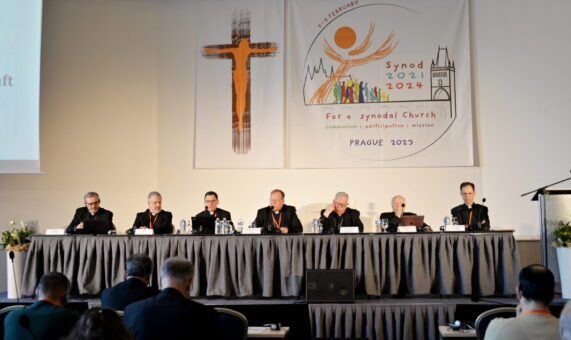
Feb 10, 2023 | Non categorizzato
The primacy of listening, a shared journey open to dialogue and encounter, the challenges of secularization, of lasting peace, of welcoming the many diversities of humanity are at the centre of this phase. Margaret Karram, President of the Focolare is one of the participants at the European Synodal Continental Assembly. “We gather in Prague, a city that can be considered a bridge between East and West, but which also expresses a warning for Europe. Today, just over thirty years after the fall of the Berlin Wall which marked the end of the world divided into opposing blocs, we have another war in the heart of Europe. We feel close to our Ukrainian siblings, in the hope that Russian aggression will end and that true peace and reconciliation will be found on our continent.” 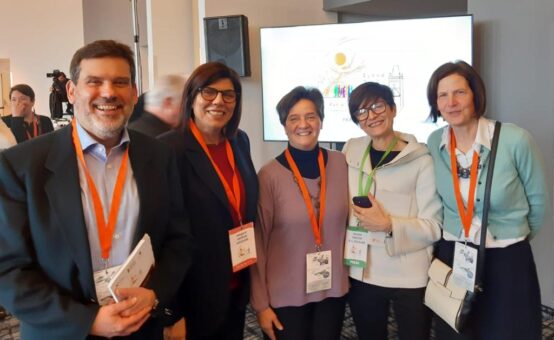 These are the words of Gintaras Grušas, Archbishop of Vilnius (Lithuania), President of the Council of European Episcopal Conferences (CCEE), in his opening speech at the European Synodal Continental Assembly. Solidarity with the Turkish and Syrian populations affected by the terrible earthquake was also expressed immediately. The meeting is taking place in the capital of the Czech Republic, from 5th-12th February, with the participation of 200 delegates from the 39 European Episcopal Conferences, from 45 countries. There were also 44 “guests” including Margaret Karram, President of the Focolare Movement. Cardinal Mario Grech, Secretary General of the Synod, offered a realistic perspective of this phase of the journey saying, “We are all learners in synodality.” The Church in Europe met to experience a journey of sharing, more necessary than ever today, to get to know each other and to break down prejudices.
These are the words of Gintaras Grušas, Archbishop of Vilnius (Lithuania), President of the Council of European Episcopal Conferences (CCEE), in his opening speech at the European Synodal Continental Assembly. Solidarity with the Turkish and Syrian populations affected by the terrible earthquake was also expressed immediately. The meeting is taking place in the capital of the Czech Republic, from 5th-12th February, with the participation of 200 delegates from the 39 European Episcopal Conferences, from 45 countries. There were also 44 “guests” including Margaret Karram, President of the Focolare Movement. Cardinal Mario Grech, Secretary General of the Synod, offered a realistic perspective of this phase of the journey saying, “We are all learners in synodality.” The Church in Europe met to experience a journey of sharing, more necessary than ever today, to get to know each other and to break down prejudices. 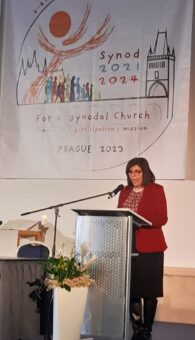 The Voice of the Churches in Europe The sessions dedicated to the experience of the synodal journey of the various Episcopal conferences gave a glimpse into the life of the Churches in Europe. From Albania where today Christians are confronted with the need to learn to dialogue with people of different religions to Belgium, where secularization has reached every social sphere. The invitation is to know how to grasp the signs of the times, giving space to the laity, avoiding every form of clericalism, every yielding to attitudes of abuse and power. In Belarus, the synodal journey brought to light the need for formation in dialogue for both the clergy and the laity in order to have a greater impact on society. Bulgaria, a country with a very small percentage of Catholics, told of a synodal path animated by a strong ecumenical spirit. This was shared by several countries of Eastern Europe, while from France came a resolute invitation to listen, to the centrality of the victims of abuse in the Church and to a path of purification in spiritual life to rediscover fidelity to Christ and to be a welcoming Church for all. The Churches of Great Britain and Wales emphasized the need for ongoing formation in the life of faith and evangelization. Transversal issues
The Voice of the Churches in Europe The sessions dedicated to the experience of the synodal journey of the various Episcopal conferences gave a glimpse into the life of the Churches in Europe. From Albania where today Christians are confronted with the need to learn to dialogue with people of different religions to Belgium, where secularization has reached every social sphere. The invitation is to know how to grasp the signs of the times, giving space to the laity, avoiding every form of clericalism, every yielding to attitudes of abuse and power. In Belarus, the synodal journey brought to light the need for formation in dialogue for both the clergy and the laity in order to have a greater impact on society. Bulgaria, a country with a very small percentage of Catholics, told of a synodal path animated by a strong ecumenical spirit. This was shared by several countries of Eastern Europe, while from France came a resolute invitation to listen, to the centrality of the victims of abuse in the Church and to a path of purification in spiritual life to rediscover fidelity to Christ and to be a welcoming Church for all. The Churches of Great Britain and Wales emphasized the need for ongoing formation in the life of faith and evangelization. Transversal issues  There are many transversal issues for the Churches of the old continent: from the scourge of abuse, to the formation of the clergy so that they regain the trust of the people of God and rise to the challenges of today’s de-Christianized and secularized society, to the question of women in the Church, to the urgency of the transmission of the faith today, but with a language and modality suited to the times. But there is one common question for all: what does it mean for the Church in Europe to be “inclusive”? How can it also embrace those people who live complex moral situations with respect to Church doctrine, such as divorced people or LGBTQ+ people? The answers can only come from a patient journey of communion. In her input, Margaret Karram said, “I believe that the response that the Church in Europe can offer today is the gift of that evangelical love that comes to us from Christ himself and is at the heart of dialogue and encounter. As a Focolare Movement we commit ourselves to this path to which the Pope is calling us.” For the Church in Europe, the synodal days in Prague are a real life experiment in synodality, which highlight the need to continue on this path. The final document, the result of these working days, will include all the requests, challenges and proposals and, together with those of the other 6 continental assemblies, will be sent to the central commission of the Synod.
There are many transversal issues for the Churches of the old continent: from the scourge of abuse, to the formation of the clergy so that they regain the trust of the people of God and rise to the challenges of today’s de-Christianized and secularized society, to the question of women in the Church, to the urgency of the transmission of the faith today, but with a language and modality suited to the times. But there is one common question for all: what does it mean for the Church in Europe to be “inclusive”? How can it also embrace those people who live complex moral situations with respect to Church doctrine, such as divorced people or LGBTQ+ people? The answers can only come from a patient journey of communion. In her input, Margaret Karram said, “I believe that the response that the Church in Europe can offer today is the gift of that evangelical love that comes to us from Christ himself and is at the heart of dialogue and encounter. As a Focolare Movement we commit ourselves to this path to which the Pope is calling us.” For the Church in Europe, the synodal days in Prague are a real life experiment in synodality, which highlight the need to continue on this path. The final document, the result of these working days, will include all the requests, challenges and proposals and, together with those of the other 6 continental assemblies, will be sent to the central commission of the Synod.
Stefania Tanesini






 These are the words of Gintaras Grušas, Archbishop of Vilnius (Lithuania), President of the Council of European Episcopal Conferences (CCEE), in his opening speech at the European Synodal Continental Assembly. Solidarity with the Turkish and Syrian populations affected by the terrible earthquake was also expressed immediately. The meeting is taking place in the capital of the Czech Republic, from 5th-12th February, with the participation of 200 delegates from the 39 European Episcopal Conferences, from 45 countries. There were also 44 “guests” including Margaret Karram, President of the Focolare Movement. Cardinal Mario Grech, Secretary General of the Synod, offered a realistic perspective of this phase of the journey saying, “We are all learners in synodality.” The Church in Europe met to experience a journey of sharing, more necessary than ever today, to get to know each other and to break down prejudices.
These are the words of Gintaras Grušas, Archbishop of Vilnius (Lithuania), President of the Council of European Episcopal Conferences (CCEE), in his opening speech at the European Synodal Continental Assembly. Solidarity with the Turkish and Syrian populations affected by the terrible earthquake was also expressed immediately. The meeting is taking place in the capital of the Czech Republic, from 5th-12th February, with the participation of 200 delegates from the 39 European Episcopal Conferences, from 45 countries. There were also 44 “guests” including Margaret Karram, President of the Focolare Movement. Cardinal Mario Grech, Secretary General of the Synod, offered a realistic perspective of this phase of the journey saying, “We are all learners in synodality.” The Church in Europe met to experience a journey of sharing, more necessary than ever today, to get to know each other and to break down prejudices.  The Voice of the Churches in Europe The sessions dedicated to the experience of the synodal journey of the various Episcopal conferences gave a glimpse into the life of the Churches in Europe. From Albania where today Christians are confronted with the need to learn to dialogue with people of different religions to Belgium, where secularization has reached every social sphere. The invitation is to know how to grasp the signs of the times, giving space to the laity, avoiding every form of clericalism, every yielding to attitudes of abuse and power. In Belarus, the synodal journey brought to light the need for formation in dialogue for both the clergy and the laity in order to have a greater impact on society. Bulgaria, a country with a very small percentage of Catholics, told of a synodal path animated by a strong ecumenical spirit. This was shared by several countries of Eastern Europe, while from France came a resolute invitation to listen, to the centrality of the victims of abuse in the Church and to a path of purification in spiritual life to rediscover fidelity to Christ and to be a welcoming Church for all. The Churches of Great Britain and Wales emphasized the need for ongoing formation in the life of faith and evangelization. Transversal issues
The Voice of the Churches in Europe The sessions dedicated to the experience of the synodal journey of the various Episcopal conferences gave a glimpse into the life of the Churches in Europe. From Albania where today Christians are confronted with the need to learn to dialogue with people of different religions to Belgium, where secularization has reached every social sphere. The invitation is to know how to grasp the signs of the times, giving space to the laity, avoiding every form of clericalism, every yielding to attitudes of abuse and power. In Belarus, the synodal journey brought to light the need for formation in dialogue for both the clergy and the laity in order to have a greater impact on society. Bulgaria, a country with a very small percentage of Catholics, told of a synodal path animated by a strong ecumenical spirit. This was shared by several countries of Eastern Europe, while from France came a resolute invitation to listen, to the centrality of the victims of abuse in the Church and to a path of purification in spiritual life to rediscover fidelity to Christ and to be a welcoming Church for all. The Churches of Great Britain and Wales emphasized the need for ongoing formation in the life of faith and evangelization. Transversal issues